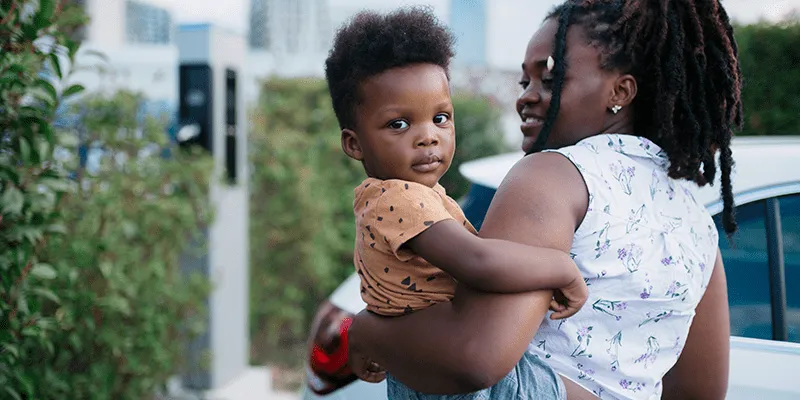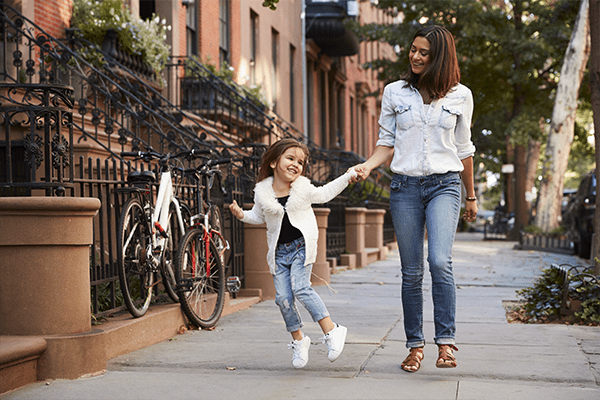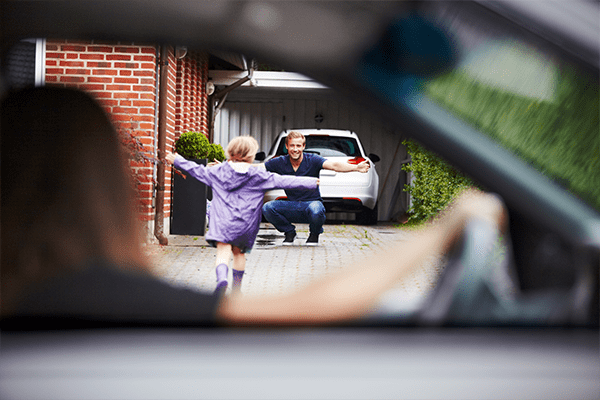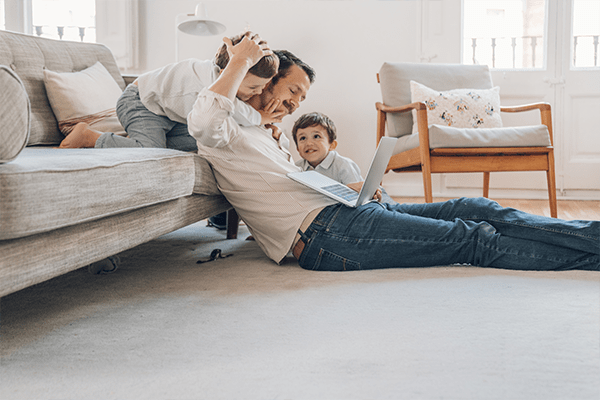Child Custody Exchange Safety
Five safety tips for child custody exchange pick-ups and drop-offs.
- 4 min read
- custody
- health & wellness

For parents navigating shared custody or visitation, child custody exchange safety is not just important—it’s imperative. Though this has always been a top priority in high-conflict co-parenting situations or previously abusive relationships, child custody exchange safety has gained widespread attention in the wake of the Cassie Carli case. Learn about Cassie Carli’s story and how to conduct safer custody exchanges with your ex.
What happened to Cassie Carli?
Carli was last seen alive on March 27, 2022, in the parking lot of a restaurant located in Navarre Beach, Florida. Authorities say the 37-year-old mother was meeting up with her ex-boyfriend that evening to exchange custody of their four-year-old daughter, Saylor, when she disappeared. Carli’s father reported her missing to the local authorities in Santa Rosa County on March 28.
According to officials, Saylor was safely located two days later. Tragically, Carli was found dead about a week later in Springville, AL. Carli’s ex-boyfriend, Marcus Spanevelo, was charged in October of 2022 in St. Clair County, AL, with abuse of a corpse in connection with her death. A federal grand jury later indicted him in January of 2023 with kidnapping that resulted in Carli’s death, a crime that could lead to life in federal prison.

Has anything changed for custody exchange safety in Florida?
This case prompted Florida lawmakers to introduce and sign new legislation that provides mandated safe spaces for parents to exchange custody of their children. The Cassie Carli Law was introduced to the Florida House of Representatives in 2023 and signed on June 5, 2024. The bill adds safety measures for co-parents throughout the state from judicial and law enforcement agencies.
With the law in place, judges can specify an authorized location for co-parents who have a risk or imminent threat of harm to themselves or their children to conduct exchanges in their parenting plan. Each sheriff’s office must provide a dedicated parking lot for co-parents to use as a safe exchange area. In honor of Carli’s favorite color, each of these lots must have a purple sign or light to identify it as the designated child custody exchange location.
In addition to the purple highlights, these lots must:
- Be accessible 24 hours a day, 7 days a week
- Maintain adequate lighting
- Have external, continuous video recording
- Use at least one camera that timestamps and retains footage for at least 45 days
Do other states have laws for child custody exchange safety?
Here are examples of legislation that promotes safer custody exchanges in other states:
- The California Family Code permits each county to facilitate supervised exchanges, visitation, and educational programs for protecting children in shared custody.
- Illinois’s Neutral Site Custody Exchange Funding Act allows counties to establish safe, neutral locations for co-parents to exchange custody of their children.
- Kansas has a statute requiring its attorney general to provide well-equipped and sufficiently staffed child exchange centers throughout the state to ensure safety.
- Parenting coordinators in Louisiana are legally mandated to assist co-parents with planning all details related to child custody exchanges.
5 tips for safer child custody exchanges
Though many parents are not worried about custody swap safety due to the more amicable nature of their situations, it’s a genuine concern for those with high-conflict co-parents, especially if they’re domestic violence survivors. If you or a loved one has a joint custody or visitation agreement in which child pick-ups and drop-offs are at play, these five tips can help promote safe exchanges.
1. Conduct exchanges in a designated public place
Many cities and counties have designated “safe zones” where parents can exchange custody in a public or monitored setting. These are often located in police department parking lots or other spaces run by local governments and private organizations. You can call local authorities to see if a designated safe exchange spot exists near you. SafeTrade Station also has a list of sites throughout the U.S. that people can use to meet safely, including parents conducting custody exchanges.
2. Only pick up and drop off your child in well-lit areas
No matter when or where you decide to meet for custody exchanges, conducting pick-ups and drop-offs in well-lit areas is always a good idea. You should follow this advice even if the exchange area is in a public place, designated as a safe zone, or under video surveillance. The U.S. Department of Justice found that improved lighting can reduce crimes for several reasons, including deterring potential offenders who fear being seen or recognized and an increased chance of police or bystanders catching an offender in the act.
3. Share your location with a loved one
Let a friend or family member know where your custody exchange is set to take place and roughly what time you are expected to be there. You can do this by texting them the address or sharing your location with them. Let your loved one know that they should expect a call or text from you after the exchange is complete to let them know everything went as planned.

4. Do not engage in arguments or debates
A custody swap is not the time or place to discuss contentious matters. Pick-ups and drop-offs should be centered around your kids and safely getting them to their destination. If your child’s other parent tries to bring up a high-conflict topic or start a fight, do not engage with them. If things escalate despite your efforts to ignore or disengage with your ex, have your phone on hand to dial authorities or someone you trust.
5. Document all communication and coordination
Exchanges are rarely the starting point of safety issues between co-parents with shared custody or visitation agreements. Typically, conflict escalates during swaps only after communication has been bad for quite some time or was unhealthy to begin with. In either case, documenting all communication and coordination with your child’s other parent in a safe, secure place is crucial.

How TalkingParents promotes safety for co-parents
If tensions with your child’s other parent have intensified to an unsafe level, recording their behaviors as evidence in court is necessary for your and your child’s well-being. You can use this documentation to revisit your current parenting agreement in court, including in-person child exchanges, split custody, or visitation allowances. Once it’s documented, it’s vital to keep everything organized to present it as evidence.
Co-parenting communication services like TalkingParents keep everything regarding your child organized and recorded. Actions taken within TalkingParents cannot be edited or deleted and are documented in our court-admissible Unalterable Records. Additionally, you do not have to share personal information like phone numbers and email addresses with your child’s other parent when using our service. This added level of security allows you to coordinate pick-ups and drop-offs while protecting your information and well-being.
Additionally, our Personal Journal lets you take private notes about anything you want. You can use this feature to document any notable interactions, thoughts, feelings, or emotions surrounding custody exchanges and your child’s other parent in a secure place. If you notice anything that could be cause for concern during a custody exchange, write it down in your Journal so you or an attorney can reference it later.